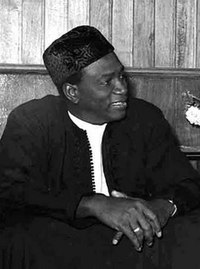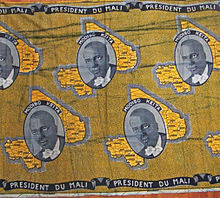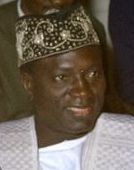Modibo Keïta
This articleneeds additional citations forverification.(March 2012) |
Modibo Keïta | |
|---|---|
 Keïta in 1966 | |
| 1stPresident of Mali | |
| In office 20 June 1960 – 19 November 1968 | |
| Preceded by | Office established |
| Succeeded by | Moussa Traoré |
| President ofMali Federation | |
| In office 4 April 1959 – 20 August 1960 | |
| Preceded by | Office Established |
| Succeeded by | Office abolished |
| Personal details | |
| Born | 4 June 1915 Bamako Coura,Upper Senegal and Niger |
| Died | 16 May 1977(aged 61) Bamako,Mali |
| Nationality | French, since 1960: Malian |
| Political party | Sudanese Union-African Democratic Rally |
| Spouses | Polygamous with 3 wives |
Modibo Keïta(4 June 1915 – 16 May 1977) was a Malian politician who served as the firstPresident of Malifrom 1960 to 1968. He espoused a form ofAfrican socialism.He was deposed in a coup d'état in 1968 byMoussa Traoré.
Born and raised inBamako,Keïta began a career as a teacher in 1936 underFrench colonial rulebefore entering politics during the 1940s. In 1945, he co-founded theSudanese Union(US) withMamadou Konatéwhich became part of theAfrican Democratic Rally(RDA) the following year to form theUS-RDA.Being elected to several positions, his political prominence grew in the 1950s, and in 1959, he became Prime Minister of theMali Federation,a short-lived federation of Mali andSenegal.Following the federation's collapse in 1960, Mali became an independent state, and Keïta became the new country's inaugural president.
As President, Keïta soon established the US-RDA as theonly official party,and began implementing socialist policies based on extensive nationalization. In foreign affairs, Keïta supported theNon-Aligned Movementand maintained strong relations with the West despite his socialist leanings. A leading Pan-Africanist, he played important roles in the drafting of the charter of theOrganization of African Unityand the negotiation the 1963 Bamako Accords, which ended theSand WarbetweenMoroccoandAlgeria.
During the late 1960s, dissatisfaction with his regime grew due to progressive economic decline and his repressive responses to dissent. He was overthrown in the1968 Malian coup d'étatbyMoussa Traoré,who succeeded him as president and sent him to prison, where he died in 1977.
Youth
[edit]Keïta was born inBamako-Coura,a neighborhood of Bamako, which was at the time the capital ofFrench Sudan.His family were Malian Muslims who claimed direct descent from the Keita dynasty, the founders of the medievalMali Empire.His nickname after primary schooling was Modo. He was educated in Bamako and at theécole normale William-PontyinDakar,where he was top of his class. Beginning in 1936, he worked as a teacher in Bamako,SikassoandTombouctou.He marriedMariam Travélé,who was also a teacher, in September 1939.
Entering politics
[edit]Modibo Keïta was involved in various associations. In 1937, he was the coordinator of the art and theater group. Along withOuezzin Coulibaly,he helped found the Union of French West African Teachers.
Keïta joined theCommunist Study Groups(GEC) cell in Bamako.
In 1943, he founded theL'oeil de Kénédougou,a magazine critical of colonial rule. This led to his imprisonment for three weeks in 1946 at thePrison de la Santéin Paris.
In 1945 Keïta was a candidate for the Constituent Assembly of theFrench Fourth Republic,supported by GEC and theSudanese Democratic Party.Later the same year, he andMamadou Konatéfounded theBloc soudanais,which developed into theSudanese Union.
Political life
[edit]In October 1946, theAfrican Democratic Rally(RDA) was created at a conference in Bamako of delegates from across French Africa. While the coalition was led byFélix Houphouët-Boigny,Keïta assumed the post of RDA Secretary-General inFrench Sudan,and head of the Soudanese affiliate: theUS-RDA.In 1948, he was elected general councilor of French Sudan. In 1956, he was elected mayor of Bamako and became a member of theNational Assembly of France.He twice served as secretary of state in the governments ofMaurice Bourgès-MaunouryandFélix Gaillard.Modibo Keïta became the premier ofMali Federationin 1959.[1]He was elected constituent assembly president of theMali Federationon 20 July 1960, which consisted of French Sudan and Senegal. Senegal would later leave the federation.
President of Mali
[edit]This sectionrelies largely or entirely on asingle source.(January 2017) |

After the collapse of the federation, the US-RDA proclaimed theSudanese Republic's complete independence as the Republic of Mali. Keïta became its first president, and soon afterward declared the US-RDA to be the only legal party.
President Keïta, whoseSudanese Union-African Democratic Rally(US/RDA) party had dominated pre-independence politics (as a member of theAfrican Democratic Rally), moved quickly to declare a single-party state and to pursue asocialistpolicy based on extensivenationalization.Keïta withdrew from the French Community and also had close ties to theEastern bloc.A continuously deteriorating economy led to a decision to rejoin the Franc Zone in 1967 and modify some of the economic excesses.[2]
As a socialist, he led his country towards the progressive socialization of the economy; at first starting with agriculture and trade, then in October 1960 creating the SOMIEX (Malian Import and Export Company), which had a monopoly over the exports of the products of Mali, as well as manufactured and food imports (e.g.sugar,tea,powdered milk) and their distribution inside the country. The establishment of the Malian franc in 1962, and the difficulties of provisioning, resulted in a severe inflation and dissatisfaction of the population, particularly the peasants and the businessmen. The authorities were also trying to introduce tough anti-slavery policies, which persisted in some parts of the country despite the official ban.
In June 1961, he paid a state visit to the United Kingdom, where QueenElizabeth IIinvested him as an honorary Knight Grand Cross of theOrder of Saint Michael and Saint George.[3]Although Keïta was initially viewed with some wariness by the United States because of his socialist views, he made it clear that he sought good relations with Washington. In September 1961, he travelled to America in the company ofSukarnoand met with PresidentJohn F. Kennedy.Keïta, afterward, felt that he had a friend in Kennedy. He travelled to the United States after the1st Summit of the Non-Aligned MovementinBelgrade,FPR Yugoslaviawhere the conference delegated him with expressing their common positions to the American administration.

He also resolved theConflictbetween Morocco and Algeria and would also try to form aunionbetweenGhana,andGuineaand worked tirelessly to improve relations with the countries of Senegal. He would also win theLenin Peace Prizefor his attempts on rebuilding the economy of Mali with socialism. However Mali was dealing with financial and economic problems, made worse by an especially poor harvest in 1968 which would later lead to acoup.[4]

On the political level, Modibo Keïta quickly imprisoned opponents likeFily Dabo Sissoko.The first post-independence elections, in1964,saw a single list of 80 US-RDA candidates returned to the National Assembly, and Keïta was duly reelected to another term as president by the legislature. From 22 August 1967,[5]he started the "revolution active" and suspended the constitution by creating theNational Committee for the Defense of the Revolution(Comité national de défense de la révolution, CNDR). The exactions of the "milice populaire" (the US-RDA militia) and the devaluation of the Malian franc in 1967 brought general unrest.
On 19 November 1968, GeneralMoussa Traoréoverthrew Modibo Keïta in acoup d'état,and sent him to prison in the northern Malian town ofKidal.

After being transferred back to the capital Bamako in February 1977 in what was claimed to be an action by the government towards national reconciliation in preparation for his release,[6]Modibo Keïta died, still a prisoner, on May 16, 1977.[7]His reputation was rehabilitated in 1992 following the overthrow of Moussa Traoré and subsequent elections of presidentAlpha Oumar Konaré.A monument to Modibo Keïta was dedicated in Bamako on June 6, 1999.
As a Pan-Africanist
[edit]
Modibo Keïta devoted his entire life to African unity. He first played a part in the creation of theFederation of MaliwithLéopold Sédar Senghor.After its collapse, he moved away from Léopold Sédar Senghor, but withSékou Touré,the president of Guinea, andKwame Nkrumah,the President of Ghana, he formed theUnion of the States of Western Africa.In 1963, he played an important role in drafting the charter of theOrganization of African Unity(OAU).
In 1963, he invited the king of Morocco and the president of Algeria to Bamako, in the hope of ending theSand War,a frontier conflict between the two nations. Along withEmperor Haile Selassieof Ethiopia, Keïta was successful in negotiating theBamako Accords,which brought an end to the conflict. As a result, he won theLenin Peace Prizethat year.
From 1963 to 1966, he normalized relations with the countries of Senegal, Upper Volta and Côte d'Ivoire. An advocate of theNon-Aligned Movement,Modibo defended the nationalist movements like the AlgerianNational Liberation Front(FLN).
In literature
[edit]Malian authorMassa Makan Diabatésatirizes Keïta's presidency in his 1979 novelLe boucher de Kouta(The Butcher of Kouta), which features a socialist, dictatorial president named "Bagabaga Daba" (literally, "ant with a big mouth" ), who is later removed by a military coup.[8]
References
[edit]- ^Kurtz, Donn M. (1970)."Political Integration in Africa: The Mali Federation".The Journal of Modern African Studies.8(3): 405–424.doi:10.1017/S0022278X00019923.JSTOR158851.S2CID154671339.
- ^"Mali".Library of Congress, Washington, D.C. 20540 USA.Retrieved2023-07-25.
- ^The Times,8 June 1961, p. 16; Issue 55102; col. B.
- ^Modibo Keita.sis.gov.eg
- ^"24. Mali (1960-present)".uca.edu.Retrieved2023-09-14.
- ^Imperato, P. J. (1989)Mali: a search for direction.Routledge. p. 69.ISBN9780367156480
- ^Diarra, P. (2009)Cent ans de catholicisme au Mali.Karthala. p. 273.ISBN2811102876
- ^Sangare, Mamadou (1999).L'histoire et le roman dans la trilogie Kouta de Massa Makan Diabate.Paris: Septentrion. p. 128.ISBN2284007996
Further reading
[edit]- Portions of this article were translated from the French-language Wikipedia articlefr:Modibo Keïta.
- memorialmodibokeita.org: Biographie.
- "Modibo Keita."Encyclopædia Britannica.2008.Encyclopædia Britannica Online. 6 October 2008.
- The Big Read: Modibo Keïta: A devoted pan-africanist,The Daily Observer(Gambia), Friday, 4 September 2008.
- Francis G. Snyder. "The Political Thought of Modibo Keita".The Journal of Modern African Studies,Vol. 5, No. 1 (May 1967), pp. 79–106
- John N. Hazard. "Mali's Socialism and the Soviet Legal Model".The Yale Law Journal,Vol. 77, No. 1 (November 1967), pp. 28–69
- Modibo Keita (1915–1977),The Presidency of South Africa (2006).
- A N'fa Diallo,Mali, 48 ans après: Socialisme, dictature, révolte et révolution.Le National(Bamako), 16 September 2008.
- 22 septembre: Le souvenir d’un grand jour.Hady Barry,Nouvel Horizon(Bamako), 19 September 2008.
- Abdrahamane Dicko,"De l’Union française à l’indépendance: Que de chemins parcourus!".Les Echos(Bamako), 19 September 2008.
Modibo Kéita: MALI.Francis Kpatindé,Jeune Afrique,25 April 2000.
- Rosa De Jorio,"Narratives of the Nation and Democracy in Mali. A View from Modibo Keita’s Memorial",Cahiers d'études africaines,172, 2003.
- page on the French National Assembly website
External links
[edit]- modibokeita.free.fr: Site devoted to Modibo Keita: portrait, discussion, photos, and videos.
- Article du journal Le Flambeau[permanent dead link]Bamako, Mali.(Organe de la Jeunesse Union Africaine – Mali): Modibo Keita "Notre liberté serait un mot vide de sens si nous devions toujours dépendre financièrement de tel ou tel pays".
- 1915 births
- 1977 deaths
- People from Bamako
- People of French West Africa
- Keita family
- Malian Muslims
- Sudanese Union – African Democratic Rally politicians
- Presidents of Mali
- Prime ministers of Mali
- Foreign ministers of Mali
- Deputies of the 3rd National Assembly of the French Fourth Republic
- Deputies of the 1st National Assembly of the French Fifth Republic
- African socialism
- Malian pan-Africanists
- Leaders ousted by a coup
- Malian prisoners and detainees
- Prisoners and detainees of Mali
- Recipients of the Lenin Peace Prize
- Honorary Knights Grand Cross of the Order of St Michael and St George
- Recipients of the Order of the Companions of O. R. Tambo
- Heads of government who were later imprisoned
- Muslim socialists
- Malian politicians
